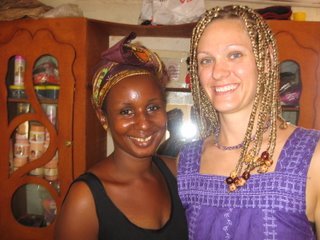
Rainy season starts at the end of June signaling the end of the school so everyone is available for planting. The men plant and look after perhaps several cash crops—coos, corn and groundnuts and the women look after the rice. Everyone is working hard and gone most of the day tending to his or her crops.
It’s also known as the hungry season. Stores are getting low and there isn't much left from the previous year's cash crops. Since everyone is out in the fields, gardens are left unattended and there are few vegetables available.
My compound becomes a giant goo of mud. The quad of my compound grows nothing—no shade trees (mangoes are the best), no grass (grass attracts snakes and other unpleasant animals), nothing so it just becomes a muddy mess. Things are more likely to get moldy although I haven't experience that in my house. Other volunteers complain of moldy clothes, shoes and everything else.
When it rains things cool off but otherwise the humidity makes everyone sweat doing the smallest task. After the rainy season ends there's a month of just the sticky humidity and constant sweating while doing nothing without the rain to cool things off. Prickly heat and heat rash are common from the constantly salty damp skin.
Because of the standing water everywhere from the rain there are plenty of mosquitoes. Some areas of the country have mosquitoes all year but I'm lucky that they are only here during the rainy season and even then they aren't bad compared to other places. Still I keep myself awake at night or wake myself up scratching if I am bitten too many times while sitting outside with my family at night before bed.
When I was first here working at my school the teachers were astonished to learn that there are indeed mosquitoes in America (Toubabodou). I explained that there are plenty but we just don't have malaria. Most of them couldn't believe that there could be a place with mosquitoes and no malaria. Only the biology teacher knew that only certain mosquitoes carry malaria. I've since learned that malaria has been nearly wiped out in the States thanks to DDT. I've also learned that there are people campaigning for a broader use of DDT in Africa to do the same here to save lives of people but this campaign is met with resistance from environmental groups. It certainly is a difficult issue.
I am in a village in the middle of the worst road in the country. I don't even know what to compare the road to—I've never seen anything like it anywhere. The rains make it worse. Drivers don't know how deep potholes are that are filled with water. Potholes grow bigger with more rain. More of the road is washed out. Detour routes become too muddy so drivers have to stick to the potholed road. Travel times double and journeys make the body sore with all the jostling and longer time spent sitting on the same position. Even the map of The Gambia says "Road conditions to Soma are poor!" The company that was working on the north bank road moved to my road at the beginning of this last rainy season and things are beginning to look better. It took them four years to get as far as they did on the north bank road and it isn't even completely paved yet though it is smooth.
One of my favorite things to do when it rains during the day is to watch the babies and kids running around and playing in the rain. It's a bath without the pesky soap and all the trouble of having to fetch water. The older kids just stand or run along the run off from the corrugate roofs. The babies and small children run around naked slipping and sliding in the mud not caring where the water comes from only that it's refreshing and that it will occupy their time for at least a few minutes. Sometimes it's not so bad having such a sloshy messy muddy compound seeing how much joy the children get from running around in it and the adults get from watching them have fun.
The rains are finished now and I won't see another drop of water from the sky until about next June. It was nice and I'll certainly enjoy the fruits of the rains literally--the watermelon here now is amazing.

